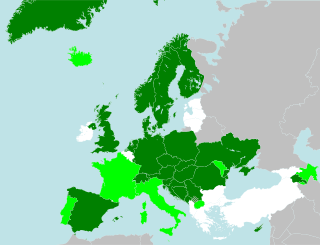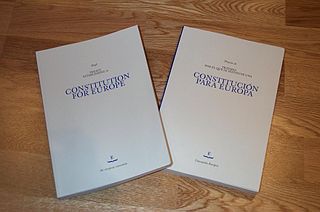
The European Charter for Regional or Minority Languages (ECRML) is a European treaty adopted in 1992 under the auspices of the Council of Europe to protect and promote historical regional and minority languages in Europe. However, the charter does not provide any criterion or definition for an idiom to be a minority or a regional language, and the classification stays in the hands of the national state.

The Treaty on European Union (2007) is one of the primary Treaties of the European Union, alongside the Treaty on the Functioning of the European Union (TFEU). The TEU forms the basis of EU law, by setting out general principles of the EU's purpose, the governance of its central institutions, as well as the rules on external, foreign and security policy.

The International Covenant on Civil and Political Rights (ICCPR) is a multilateral treaty that commits nations to respect the civil and political rights of individuals, including the right to life, freedom of religion, freedom of speech, freedom of assembly, electoral rights and rights to due process and a fair trial. It was adopted by United Nations General Assembly Resolution 2200A (XXI) on 16 December 1966 and entered into force on 23 March 1976 after its thirty-fifth ratification or accession. As of June 2022, the Covenant has 173 parties and six more signatories without ratification, most notably the People's Republic of China and Cuba; North Korea is the only state that has tried to withdraw.

The Treaty establishing a Constitution for Europe was an unratified international treaty intended to create a consolidated constitution for the European Union (EU). It would have replaced the existing European Union treaties with a single text, given legal force to the Charter of Fundamental Rights, and expanded qualified majority voting into policy areas which had previously been decided by unanimity among member states.

The Charter of Fundamental Rights of the European Union (CFR) enshrines certain political, social, and economic rights for European Union (EU) citizens and residents into EU law. It was drafted by the European Convention and solemnly proclaimed on 7 December 2000 by the European Parliament, the Council of Ministers and the European Commission. However, its then legal status was uncertain and it did not have full legal effect until the entry into force of the Treaty of Lisbon on 1 December 2009.

The Treaty of Accession 2005 is an agreement between the member states of European Union and Bulgaria and Romania. It entered into force on 1 January 2007. The Treaty arranged accession of Bulgaria and Romania to the EU and amended earlier Treaties of the European Union. As such it is an integral part of the constitutional basis of the European Union.

The Framework Convention for the Protection of National Minorities (FCNM) is a multilateral treaty of the Council of Europe aimed at protecting the rights of minorities. It came into effect in 1998 and by 2009 it had been ratified by 39 member states.
Minority rights are the normal individual rights as applied to members of racial, ethnic, class, religious, linguistic or gender and sexual minorities, and also the collective rights accorded to any minority group.
Linguistic rights are the human and civil rights concerning the individual and collective right to choose the language or languages for communication in a private or public atmosphere. Other parameters for analyzing linguistic rights include the degree of territoriality, amount of positivity, orientation in terms of assimilation or maintenance, and overtness.

The European Union (EU) is a political and economic union of 27 member states that are party to the EU's founding treaties, and thereby subject to the privileges and obligations of membership. They have agreed by the treaties to share their own sovereignty through the institutions of the European Union in certain aspects of government. State governments must agree unanimously in the Council for the union to adopt some policies; for others, collective decisions are made by qualified majority voting. These obligations and sharing of sovereignty within the EU make it unique among international organisations, as it has established its own legal order which by the provisions of the founding treaties is both legally binding and supreme on all the member states. A founding principle of the union is subsidiarity, meaning that decisions are taken collectively if and only if they cannot realistically be taken individually.

Estonian citizenship law details the conditions by which a person is a citizen of Estonia. The primary law currently governing these requirements is the Citizenship Act, which came into force on 1 April 1995.

The Minority Treaties are treaties, League of Nations mandates, and unilateral declarations made by countries applying for membership in the League of Nations that conferred basic rights on all the inhabitants of the country without distinction of birth, nationality, language, race or religion. The country concerned had to acknowledge the clauses of the treaty as fundamental laws of state and as obligations of international concern placed under the guarantee of the League of Nations. Most of the treaties entered into force after the Paris Peace Conference.

The Latvian nationality law is based on the Citizenship Law of 1994. Before 2020, it was primarily based on jus sanguinis.

In the European Union (EU), enhanced cooperation is a procedure where a minimum of nine EU member states are allowed to establish advanced integration or cooperation in an area within EU structures but without the other members being involved. As of October 2017, this procedure is being used in the fields of the Schengen acquis, divorce law, patents, property regimes of international couples, and European Public Prosecutor and is approved for the field of a financial transaction tax.

The Treaty of Lisbon is an international agreement that amends the two treaties which form the constitutional basis of the European Union (EU). The Treaty of Lisbon, which was signed by all EU member states on 13 December 2007, entered into force on 1 December 2009. It amends the Maastricht Treaty (1992), known in updated form as the Treaty on European Union (2007) or TEU, as well as the Treaty of Rome (1957), known in updated form as the Treaty on the Functioning of the European Union (2007) or TFEU. It also amends the attached treaty protocols as well as the Treaty establishing the European Atomic Energy Community (EURATOM).

The Council of Europe Convention on Preventing and Combating Violence Against Women and Domestic Violence, better known as the Istanbul Convention, is a human rights treaty of the Council of Europe opposing violence against women and domestic violence which was opened for signature on 11 May 2011, in Istanbul, Turkey. The convention aims at prevention of violence, victim protection and to end the impunity of perpetrators.

The Treaty on Stability, Coordination and Governance in the Economic and Monetary Union; also referred to as TSCG, or more plainly the Fiscal Stability Treaty is an intergovernmental treaty introduced as a new stricter version of the Stability and Growth Pact, signed on 2 March 2012 by all member states of the European Union (EU), except the Czech Republic and the United Kingdom. The treaty entered into force on 1 January 2013 for the 16 states which completed ratification prior to this date. As of 3 April 2019, it had been ratified and entered into force for all 25 signatories plus Croatia, which acceded to the EU in July 2013, and the Czech Republic.

The Treaties of the European Union are a set of international treaties between the European Union (EU) member states which sets out the EU's constitutional basis. They establish the various EU institutions together with their remit, procedures and objectives. The EU can only act within the competences granted to it through these treaties and amendment to the treaties requires the agreement and ratification of every single signatory.
Armenian law, that being the modern Legal system of Armenia, is a system of law acted in Armenia.




















